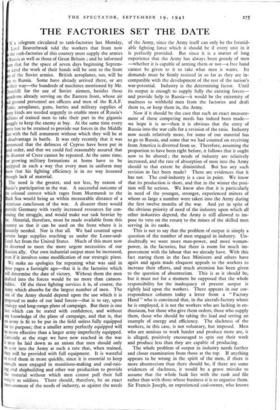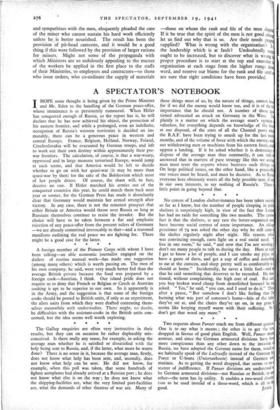THE FACTORIES SET THE DATE
a telegram circulated to tank-factories last Monday, Lord Beaverbrook told the workers that from now the tank-factories of this country must supply the armies Russia as well as those of Great Britain ; and he informed em that for the space of seven days beginning Septem- 22nd the work of their hands will be sent to the front of the Soviet armies. British aeroplanes, too, will be nt to Russia. Some have already arrived there, or are their way—the hundreds of machines mentioned by Mr. urchin for the use of Soviet airmen, besides those uadrons already serving on the Eastern front, whose air d. ground persounel are officers and men of the R.A.F. nks, aeroplanes, guns, lorries and military supplies of any kinds are needed urgently to enable more of Russia's ons of trained men to take their part in the gigantic uggle to keep the enemy at bay. At the same time every rye has to be strained to provide our forces in the Middle t with the full armament without which they will be at disadvantage in battle. It was only recently that it was ounced that the defences of Cyprus have been put in order, and that we could feel reasonably assured that disaster of Crete cannot be repeated. At the same time, ur growing military formations at home have to be uipped in such a way that every man in uniform may ow that his fighting efficiency is in no way lessened ough lack of material.
The need is the greater, and not less, by reason of ussia's participation in the war. A successful outcome of e colossal contest which rages from Murmansk to the ack Sea would bring us within measurable distance of a ictorious conclusion of the war. A disaster there would rovide Germany with vastly increased resources for con- Inning the struggle, and would make our task heavier by ar. Material, therefore, must be made available from this ountry so that it can be used on the front where it is scantly needed. Nor is that all. We had counted upon certain large supplies reaching us under the Lease-and- Lend Act from the United States. Much of this must now he diverted to meet the more urgent necessities of our Russian ally. Our own industrial output must be increased, even if it involves some modification of our strategic plans. We make no apologies for repeating what was said in these pages a fortnight ago—that it is the factories which will determine the date of victory. Without them the men drafted into the forces would be no more than cannon- fodder. Of the three fighting services it is, of course, the Army which absorbs far the largest number of men. The size of the Army should depend upon the use which it is proposed to make of our land forces—that is to say, upon strategy and long-range plans of campaign. But there is one fact which can be stated with confidence, and without any knowledge of the plans of campaign, and that is, that no army is fit to be put in the field unless fully equipped for its purpose; that a smaller army perfectly equipped will be more effective than a larger army imperfectly equipped. Certainly at the stage we have now reached in the war It may be laid down as an axiom that men should only be sent into the Army at such a rate that, when trained, they will be provided with full equipment. It is wasteful to send them in more quickly, since it is essential to keep enough men engaged in munitions-making and coal-rais- Dag and shipbuilding and other war production to provide the material without which men cannot pull their full weight as soldiers. There should, therefore, be an exact measurement of the needs of industry, as against the needs of the Army, since the Army itself can only be the formid- able fighting force which it should be if every unit in it is perfectly provided. But since it is a matter of long experience that the Army has always been greedy of men —whether it is capable of arming them or not—a free hand cannot be given to it to take what men it wants. Its demands must be firmly resisted in so far as they are in- compatible with the development of the rest of the nation's war-potential. Industry is the determining factor. Until its output is enough to supply fully the existing forces— and provide help to Russia—it would be the extremity of madness to withhold men from the factories and draft them to, or keep them in, the Army.
Now if it should be the case that such an exact measure- ment of these competing needs has indeed been made— we hope it is so—then it is obvious that the entry of Russia into the war calls for a revision of the ratio. Industry now needs relatively more, for some of our material has to go to Russia, and some that we had counted on receiving from America is diverted from us. Therefore, assuming the proportion to have been right before, it follows that it ought now to be altered ; the needs of industry are relatively increased, and the rate of absorption of men into the Army should to that extent be diminished. But has any such revision in fact been made? There are evidences that it has not. The coal-industry is a case in point. We know that its production is short, and that in the winter the posi- tion will be serious. We know also that it is particularly in need of the younger, stronger, experienced miners of whom so large a number were taken into the Army during the first twelve months of the war. And yet in spite of the obvious priority of need of the industry upon which all other industries depend, the Army is still allowed to im- pose its veto on the return to the mines of the skilled men serving in its ranks.
This is not to say that the problem of output is simply a question of the number of men engaged in industry. Un- doubtedly we want more man-power, and more woman- power, in the factories, but there is room for much im- provement with the labour that we already have. With this fact staring them in the face Ministers and others have again and again made eloquent appeals to the workers to increase their efforts, and much attention has been given to the question of absenteeism. This is as it should be, but it must not for a moment be supposed that the whole responsibility for the inadequacy of present output is rightly laid upon the workers. There appears in our cor- respondence columns today a letter from a " Factory Hand " who is convinced that, in the aircraft-factory where he is employed, it is not the workers who are lacking in en- thusiasm, but those who give them orders, those who supply them, those who should be taking thr lead and setting, an example of energy and efficiency. The slackness of the workers, in this case, is not voluntary, but imposed. Men who are anxious to work harder and produce more are, it is alleged, positively encouraged to spin out their work and produce less than they are capable of producing.
The whole problem of output in industry needs further and closer examination from those at the top. If anything appears to be wrong in the spirit of the men, if there is more absenteeism than there should be, if there are some evidences of slackness, it would be a grave mistake to assume that the whole fault lies with the rank and file rather than with those whose business it is to organise them. Sir Francis Joseph, an experienced coal-owner, who knows and sympathises with the men, eloquently pleaded the case of the miner who cannot sustain his hard work efficiently unless he is better nourished. The result has been the provision of pit-head canteens, and it would be a good thing if this were followed by the provision of larger rations for miners. Might not some of the propaganda with which Ministers are so sedulously appealing to the masses of the workers be applied in the first place to the staffs of their Ministries, to employers and contractors—to those who issue orders, who co-ordinate the supply of materials —those on whom the rank and file of the men de If it be true that the spirit of the men is not good eno let us find out why that is so. Are their needs pro supplied? What is wrong with the organisation? is the leadership which is at fault? Undoubtedly nu ought to be increased, but to discover what is wrong proper procedure is to start at the top and examine organisation at each stage from the higher rungs do ward, and reserve our blame for the rank and file until are sure that right conditions have been provided.



























 Previous page
Previous page